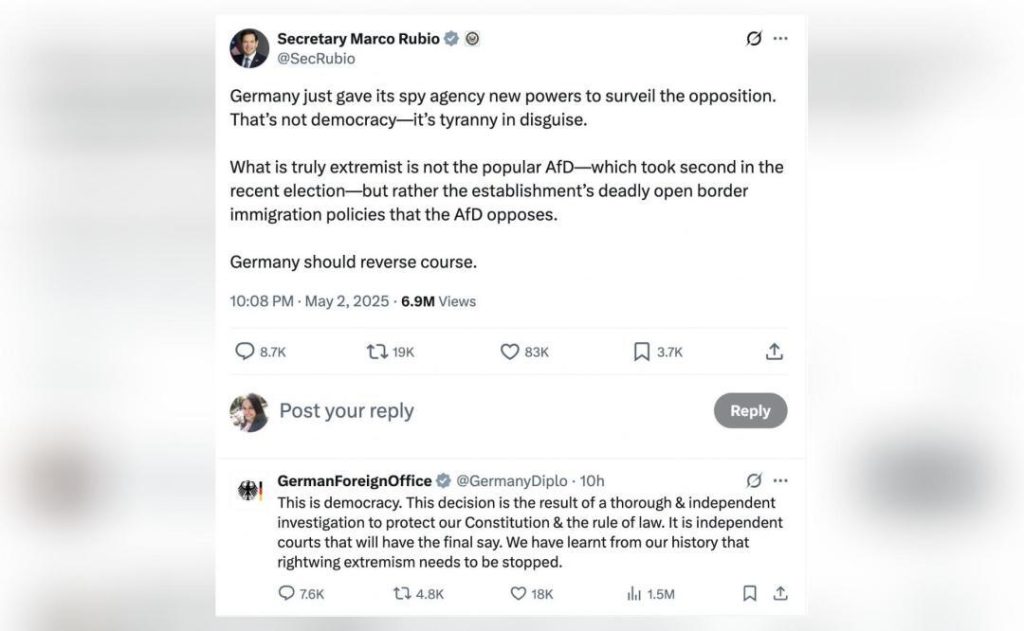
US’ Rubio & German govt clash over AfD party’s ‘extremist’ tag
The political landscape in Germany has taken a dramatic turn as the US Secretary of State Marco Rubio and the German Foreign Ministry clashed over the term “extremist” applied to the far-right Alternative for Germany (AfD) party by Germany’s spy agency. The controversy has sparked heated debate, with Rubio accusing Germany of enabling “tyranny in disguise” and the German government defending its decision as necessary to protect the country’s Constitution.
The dispute began when Germany’s domestic intelligence agency, the Federal Office for the Protection of the Constitution (BfV), classified the AfD party as “extremist” due to its anti-immigrant and anti-Muslim rhetoric. The decision was made after a thorough investigation, according to the German government. However, US Secretary of State Marco Rubio took strong exception to the term, labeling Germany’s move as an attempt to suppress political dissent.
Rubio’s remarks were made during a meeting with German Foreign Minister Annalena Baerbock, where he expressed his concerns about the AfD party’s classification as “extremist”. The US Secretary of State argued that the term was overly broad and could be used to silence political opponents. He also criticized Germany’s handling of the AfD party, stating that it was an attempt to curb freedom of speech and political expression.
The German government, however, defended its decision, stating that the classification was a result of a thorough investigation to protect the country’s Constitution. In a statement, the German Foreign Ministry replied to Rubio’s concerns, saying, “The decision regarding AfD is a result of thorough investigation to protect our Constitution. We will not comment further on this issue.”
The AfD party, which has been a significant force in German politics, has been criticized for its anti-immigrant and anti-Muslim rhetoric. The party has also been accused of promoting racist and xenophobic views. However, the party’s leaders have denied these allegations, claiming that they are fighting for Germany’s cultural and national identity.
The controversy has sparked a heated debate in Germany, with some politicians and experts arguing that the AfD party’s ideology is indeed extremist and poses a threat to German democracy. Others, however, have criticized the German government’s decision, stating that it is an attempt to silence political opponents and stifle freedom of speech.
The US Secretary of State’s comments have also sparked a debate in the United States, with some politicians and experts arguing that the AfD party’s ideology is similar to that of white supremacist and neo-Nazi groups. Others have argued that the US government should not interfere in Germany’s internal affairs and that the classification of the AfD party as “extremist” is a matter for the German government to decide.
The controversy has also highlighted the complex issue of political extremism in Germany, where the AfD party is not the only political force that has been accused of promoting extremist views. Other parties, such as the left-wing Die Linke party, have also been accused of promoting radical views.
In conclusion, the clash between US Secretary of State Marco Rubio and the German Foreign Ministry over the AfD party’s “extremist” designation has sparked a heated debate in Germany and the United States. While the German government has defended its decision, citing the need to protect the country’s Constitution, Rubio has accused Germany of enabling “tyranny in disguise”. The controversy serves as a reminder of the complex issues surrounding political extremism and the need for careful consideration and nuanced debate.



